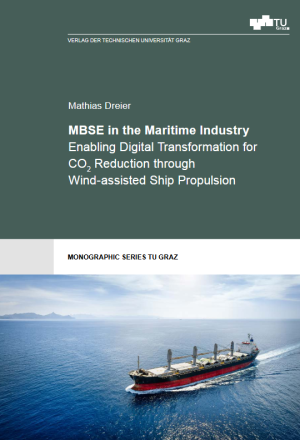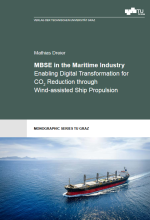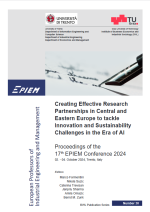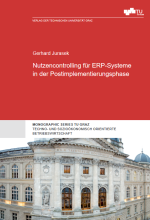Enabling Digital Transformation for CO2 Reduction through Wind-assisted Ship Propulsion
Issue: Open Access E-Book
ISBN: 978-3-99161-044-1
Language: Englisch
Release date: April 2025
Series: Monographic Series TU Graz
This master’s thesis applies model-based systems engineering (MBSE) methodologies in the maritime industry to support its digital transformation and decarbonization. As a key global economic sector, international marine shipping faces urgent challenges related to resilient supply chains, digitalization, and energy transition in response to the climate crisis. The goal of net-zero emissions in the maritime sector by 2050 has been outlined in the 2023 IMO Strategy on Reduction of GHG Emissions from Ships and is in line with the Paris Agreement.
The thesis presents a detailed system model of a bulk carrier ship that uses a wind-assistance device (WAD) for auxiliary propulsion, developed with the Arcadia modeling language/method and the Capella tool. This work emphasizes the integration of wind-assisted ship propulsion (WASP) into existing and future ships as a strategy to reduce GHG emissions. It highlights the potential of MBSE to enhance ship design practices, improve stakeholder communication, and manage the complexity of marine systems effectively. The thesis also provides a theoretical framework of systems engineering (SE) and MBSE fundamentals, and explores how these methodologies can contribute to the decarbonization of marine shipping by 2050.
This master’s thesis applies model-based systems engineering (MBSE) methodologies in the maritime industry to support its digital transformation and decarbonization. As a key global economic sector, international marine shipping faces urgent challenges related to resilient supply chains, digitalization, and energy transition in response to the climate crisis. The goal of net-zero emissions in the maritime sector by 2050 has been outlined in the 2023 IMO Strategy on Reduction of GHG Emissions from Ships and is in line with the Paris Agreement.
The thesis presents a detailed system model of a bulk carrier ship that uses a wind-assistance device (WAD) for auxiliary propulsion, developed with the Arcadia modeling language/method and the Capella tool. This work emphasizes the integration of wind-assisted ship propulsion (WASP) into existing and future ships as a strategy to reduce GHG emissions. It highlights the potential of MBSE to enhance ship design practices, improve stakeholder communication, and manage the complexity of marine systems effectively. The thesis also provides a theoretical framework of systems engineering (SE) and MBSE fundamentals, and explores how these methodologies can contribute to the decarbonization of marine shipping by 2050.







